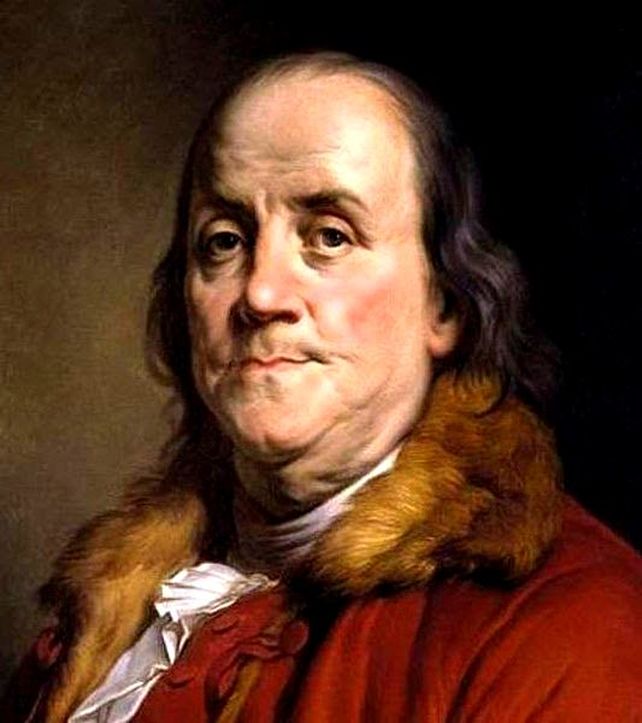The Thirteen Virtues of Benjamin Franklin
At 20 years of age, in 1726, Benjamin Franklin devised a list of 13 virtues to keep for as long as possible, in an attempt to, “live without committing any fault at any time.” He then focused on one virtue each week and kept notes on his progress. His list follows.
Temperance. Eat not to dullness; drink not to elevation.
Silence. Speak not but what may benefit others or yourself; avoid trifling conversation.
Order. Let all your things have their places; let each part of your business have its time.
Resolution. Resolve to perform what you ought; perform without fail what you resolve.
Frugality. Make no expense but to do good to others or yourself; that is, waste nothing.
Industry. Lose no time; be always employed in something useful; cut off all unnecessary actions.
Sincerity. Use no hurtful deceit; think innocently and justly, and, if you speak, speak accordingly.
Justice. Wrong none by doing injuries, or omitting the benefits that are your duty.
Moderation. Avoid extremes; forbear resenting injuries so much as you think they deserve.
Cleanliness. Tolerate no uncleanliness in body, clothes, or habitation.
Chastity. Rarely use venery but for health or offspring; never to dullness, weakness, or the injury of your own or another’s peace or reputation.
Tranquility. Be not disturbed at trifles, or at accidents common or unavoidable.
Humility. Imitate Jesus and Socrates.
by Benjamin Franklin: “The Autobiography of Benjamin Franklin” (French edition (1789), English edition (1793))
Benjamin ‘Ben’ Franklin was born on 7 January 1706 in Boston, Massachusetts, United States of America. He became a writer, a printer, a publisher, a satirist, a political theorist, a politician, a postmaster, a scientist, an inventor, and a diplomat. He was the American ambassador to France, inventor of bifocal eyeglasses (1780), publisher of Poor Richard’s Almanack (1732 - 1757), and an American Revolutionary War era statesman. He is included among the founders of the United States of America. Benjamin ‘Ben’ Franklin passed on at 84 years of age on 17 April 1790.
Temperance. Eat not to dullness; drink not to elevation.
Silence. Speak not but what may benefit others or yourself; avoid trifling conversation.
Order. Let all your things have their places; let each part of your business have its time.
Resolution. Resolve to perform what you ought; perform without fail what you resolve.
Frugality. Make no expense but to do good to others or yourself; that is, waste nothing.
Industry. Lose no time; be always employed in something useful; cut off all unnecessary actions.
Sincerity. Use no hurtful deceit; think innocently and justly, and, if you speak, speak accordingly.
Justice. Wrong none by doing injuries, or omitting the benefits that are your duty.
Moderation. Avoid extremes; forbear resenting injuries so much as you think they deserve.
Cleanliness. Tolerate no uncleanliness in body, clothes, or habitation.
Chastity. Rarely use venery but for health or offspring; never to dullness, weakness, or the injury of your own or another’s peace or reputation.
Tranquility. Be not disturbed at trifles, or at accidents common or unavoidable.
Humility. Imitate Jesus and Socrates.
by Benjamin Franklin: “The Autobiography of Benjamin Franklin” (French edition (1789), English edition (1793))
Benjamin ‘Ben’ Franklin was born on 7 January 1706 in Boston, Massachusetts, United States of America. He became a writer, a printer, a publisher, a satirist, a political theorist, a politician, a postmaster, a scientist, an inventor, and a diplomat. He was the American ambassador to France, inventor of bifocal eyeglasses (1780), publisher of Poor Richard’s Almanack (1732 - 1757), and an American Revolutionary War era statesman. He is included among the founders of the United States of America. Benjamin ‘Ben’ Franklin passed on at 84 years of age on 17 April 1790.






































































































